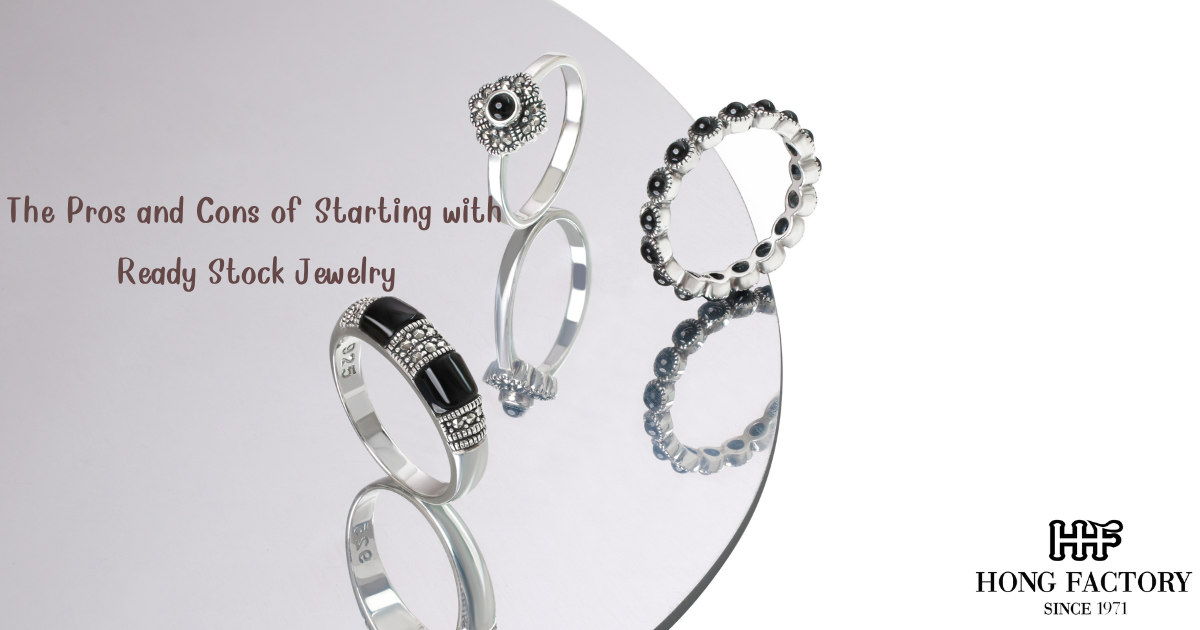For new jewelry businesses and retailers entering the wholesale space, the decision between producing made-to-order (MTO) pieces or sourcing ready stock can have a significant impact on early success.
Ready stock jewelry pre-produced designs that are immediately available for purchase and resale offers many advantages, but it also comes with limitations. To help you make a smart, strategic decision, here’s a detailed breakdown of the pros and cons of starting with ready stock jewelry and how to use it wisely to build or grow your brand.
The Pros and Cons of Starting with Ready Stock Jewelry

What Is Ready Stock Jewelry?
Ready stock refers to jewelry that has already been manufactured and is held in inventory by a supplier. Retailers can order these pieces and have them shipped quickly, without waiting for production.
Unlike custom or OEM collections, ready stock doesn’t require design development or mold creation what you see is what you get.
The Pros of Starting with Ready Stock Jewelry
1. Fast Time-to-Market
You can receive inventory and begin selling within days, not weeks or months.
Why it matters:
- Perfect for seizing seasonal trends or last-minute campaigns
- Allows for quick testing in new markets or platforms
- Supports agile inventory management
2. Lower Upfront Investment
Because you’re not paying for molds, design time, or high MOQs, the initial cost barrier is much lower.
- Ideal for startups or solo entrepreneurs
- Easier cash flow management
- Less financial risk in the early stages
3. Wide Variety of Styles
Many suppliers offer thousands of designs in ready stock across categories: rings, earrings, pendants, bracelets, brooches, and more.
This means you can:
- Curate your own unique collection from existing options
- Build collections around trends, seasons, or themes
- Test different aesthetics to discover your audience
4. Immediate Access to Best-Sellers
Suppliers typically include proven designs that perform well in different markets.
Advantage:
- Faster validation of customer preferences
- Opportunity to sell what’s already working globally
- Gain insights before investing in custom designs
5. Simplified Logistics
Ready stock jewelry is often packaged and quality-checked before sale.
Result:
- Less stress over production timelines
- Reduced need for post-delivery inspections
- Efficient inventory turnover
6. Easier to Launch Seasonal Collections
You can quickly assemble spring, summer, or holiday-specific assortments.
This helps with:
- Limited-edition campaigns
- Pop-up shops and short-term promotions
- Subscription boxes or gifting bundles

The Cons of Starting with Ready Stock Jewelry
1. Limited Customization
You can’t easily change the design, stone, metal, or sizing.
Challenge:
- Harder to differentiate your brand
- No ability to reflect unique values, symbols, or aesthetics
2. No Design Exclusivity
Other retailers may be selling the same designs.
Risk:
- Increased competition, especially in online marketplaces
- Difficulty in establishing a distinct visual identity
3. Inventory May Sell Out
Popular designs can run out quickly and restocking isn’t always guaranteed.
Impact:
- Marketing efforts may go to waste if the product disappears
- Disrupts brand consistency or ongoing campaigns
4. Limited Control Over Storytelling
You inherit someone else’s design narrative, which may or may not align with your brand values.
Consequence:
- Missed opportunity to create deeper customer connection
- Less emotional impact in product positioning
5. Minimal Packaging or Branding Flexibility
Some ready stock comes with standard packaging—or none at all.
Limitation:
- Extra steps required to make it brand-aligned
- May affect unboxing experience and perceived value
6. Scaling May Be Capped
As your brand grows, you may outpace the variety or availability of ready stock.
What this means:
- You’ll eventually need to transition to made-to-order or OEM
- Strategic planning becomes crucial to avoid gaps in supply

When Ready Stock Is the Right Choice
Ready stock works best when you:
- Are just starting out and want to test the market
- Need to react quickly to seasonal opportunities
- Want to curate a boutique assortment without production headaches
- Have limited budget or small storage space
- Run gift shops, subscription boxes, or pop-up retail
When You Might Outgrow Ready Stock
You may need to switch or supplement with custom production when:
- You want exclusive products tied to your brand identity
- Your customer base demands personalization
- You’re scaling into higher-end or wholesale channels
- You want full control over packaging, branding, and storytelling
Blending Both for Growth
Many successful jewelry brands start with ready stock and transition gradually to custom designs.
Hybrid Approach:
- Use ready stock for core SKUs or seasonal drops
- Introduce 2–3 OEM pieces per collection for brand building
- Test designs using ready stock before committing to custom molds
This strategy helps balance cash flow, creative expression, and scalability.
Start Smart, Scale Strategically
Ready stock jewelry gives you speed, simplicity, and variety. It’s a smart launchpad for new businesses or product lines—and when used strategically, it can fund your growth into exclusive, custom collections.
The key is knowing when to use it, how to differentiate your brand even with shared designs, and when it’s time to expand. With the right partner and plan, starting with ready stock isn’t a limitation. It’s a launch strategy that makes your business lighter, faster, and ready to grow.
